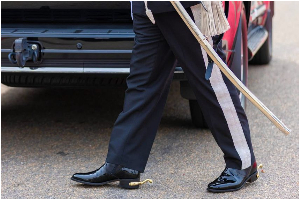My dear mother, (God bless her soul), to her dying day, would not buy or approve of anybody buying groundnut paste from the market or shop. If she was going to make groundnut soup, the paste had to be made at home. It was a laborious process and we, her female children, hated it. This meant roasting the groundnuts, and then grinding them into a smooth paste before the soup could be prepared.
She claimed you could never be sure of the “purity” of the paste in the market and she was certain that the market women “added strange things to it”.
She was not enthusiastic about the imported peanut butter either. I must say this meant I found cooking in the Ohene household a very laborious and time-consuming undertaking and this put me off cooking as an activity and cookery as a school subject, but that is another story.
I have been thinking of my mother and wondering how she would have reacted to the scandal of the adulterated palm oil in our markets. She never bought palm oil from the market; it was made for her. But surely, we have moved on since those days and we can count on safe food from the markets and there are many agencies that make sure the food offered for sale is safe?
Food safety
If you try to trace the beginnings of this palm oil saga, you have to wonder about the institutions and people who have been charged with looking after food safety in our country. It was back in April the British Food Safety Authority FSA, issued a Food Alert for Action which stated that Ghanaian palm oil which contained the illegal Sudan 1V dye was being sold in a shop in south London. The alert gave a comprehensive report on the product, advice to consumers and spelled out what the enforcement officers were going to do.
Four months later, our officials issue a lame warning that palm oil in our markets contains the dye? Why have we not been given any guidance about what to do with the palm oil that is on our kitchen shelves and that is still being sold in the markets?
Unfortunately, this incident is going to have repercussions way beyond the fear of many people contracting cancer as a result of cooking with palm oil laced with carcinogenic dye. Franklin Cudjoe’s Imani Ghana issued an alert on the FDA’s alert that is worth paying attention to. It is a fact that there have been campaigns against palm oil in Western countries and the current situation is bound to fuel that negative propaganda.
Effect on our palm oil industry
One of the stories that is regularly told to demonstrate how Ghana has fallen behind those it started life with has been about the palm oil industry. We are told that Malaysia sent a delegation to Ghana to learn about the plant from us and some 30 years later they had turned it into a most thriving industry. We have been trying to make a success of the oil palm industry these past 15 years and Franklin Cudjoe wonders what will happen to all the investment, if this adulteration scandal is not handled firmly to restore confidence.
Then, of course, there is the little matter of personal food preferences. Many of us love palm oil; we were brought up on it and it features in lots of what we eat. Should we stop eating it?
I have another problem. This is bound to be a disaster for those of us who have been campaigning for our foods to be processed to take the tedium out of cooking. It takes forever for the simplest meal to be cooked in this country because everything has to be made from scratch.
I can just hear some people demanding that rather than risk buying palm oil from the market, it should be made at home. Home-made groundnut paste, home-made palm oil, home-made fruit juice, home-made honey, and it takes all day to make a pot of soup just to be sure it is safe. When shall we move into the 21st century? A little confession, the only palm oil that enters my kitchen comes from Abutia and is made by or under the supervision of my Auntie Charity.
Travel talk
Back in March this year, I wrote in this columns about what seems to happen to our President when he travels outside Ghana and finds himself in front of an audience of expatriate Ghanaians. This is the way I put it then: “Every time the President has got into a sticky situation with something that he has said, it seems to have been when he strays off his prepared text or when he tries to illustrate something he is saying with a colourful anecdote or proverb or wise saying. And he tends to be, especially, vulnerable to these slip-ups when he is talking to a Ghanaian audience outside the country.”
When he steps out of this country something seems to loosen his tongue and he gets carried away. I made reference to speeches he made in Massachusetts and in Botswana. After months of being dogged by his “dead goat syndrome” speech, His Excellency told us he would no longer be a dead goat.
Then he went to India, found a Ghanaian audience, turned to his current favourite subject; which is how he wouldn’t be spending beyond budget during the election year. If he came across a “No light, No vote” sign during the campaign, he won’t see.
Mr President, methinks thou doth protest far, far too much. Don’t tell us these things and, especially, not when you are out of the country. Or, maybe, you should cut down on your travels if it is the outside atmosphere that makes you say these things.
There is nothing in your track record or your current behaviour that would back up your protestations of not spending over budget. You are still borrowing, government agencies are borrowing, just check on Parliament and see whether loans are not being brought and, of course, they will be passed. And if people put up signs and you refuse to see, it means you are back in your dead goat syndrome. You are supposed to see us and hear us.
Opinions of Wednesday, 4 November 2015
Columnist: Elizabeth Ohene















